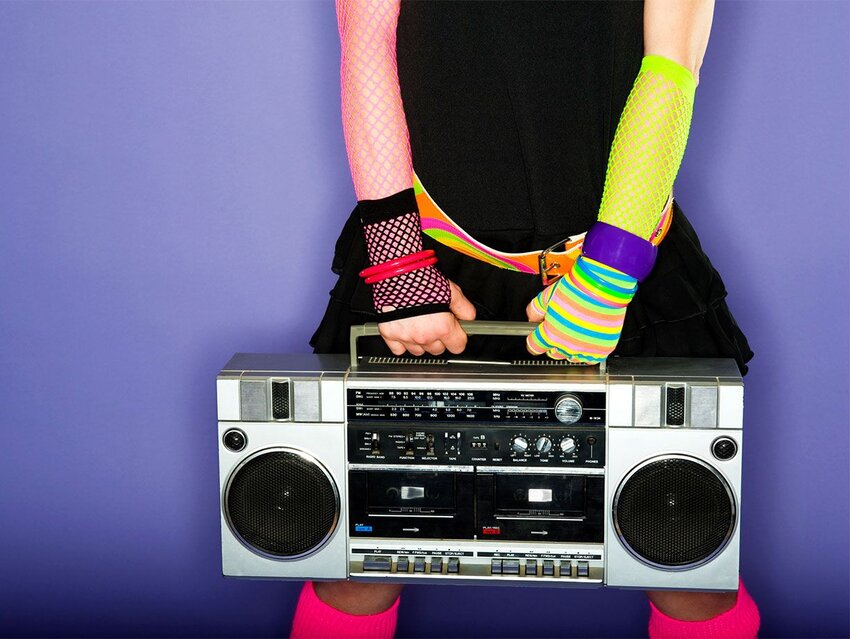Missing the ’80s? Take a chill pill — we’ve got you covered. Check out the etymology behind some of the gnarliest words from the decade of MTV, street fashion, hip-hop, and teen flicks.
Gnarly
Adjective
- Difficult, dangerous, or challenging.
- Very good; excellent.
In Fast Times at Ridgemont High, teen surfer Jeff Spicoli (played by Sean Penn) is known for his laid-back attitude and liberal use of surfer lingo, including “gnarly!” According to Green’s Dictionary of Slang, it was this 1982 movie that sent the word “gnarly” mainstream. Surfers first picked up the term in the 1970s from the word “gnarl,” meaning “rough or knotty,” which they equated to rough waves on the sea. By 1978, it had two opposite meanings, ranging from “bizarre or frightening” to “amazing or wonderful” — both are still used today.
Wannabe
Noun
A person who tries to be like someone else or to fit in with a particular group of people.
“Wannabe” first popped up in surfer lingo in the early 1980s as an elision of “want to be,” likely as a disparaging label that “real” surfers gave to tourists, unseasoned surfers, and the like.
By the mid-1980s, Madonna was at the height of her fame with the release of her 1984 hit “Like a Virgin,” and the media had labeled her fans as “Madonna wannabes.” It was no surprise that so many people wanted to be Madonna. Pop culture defined the decade, and the “Queen of Pop” reigned.
Boom box
Noun
A portable sound system, typically including radio and cassette or CD player, capable of powerful sound.
The boom-box scene from Say Anything (1989) will surely go down in history as one of the most memorable movie moments of the decade. Who can forget Lloyd Dobler (John Cusack) holding his boom box overhead while Peter Gabriel’s “In Your Eyes” blares from the speakers, communicating everything Lloyd couldn’t say himself. One of the first written examples of “boom box” comes from a 1981 New York Times article, describing “the so-called boom boxes” as "blaring behemoths that can weigh up to 30 pounds and announce their presence a block away.” The boom box virtually disappeared from the market along with cassettes and CDs, to be replaced with online streaming music in the last decade, but the equipment has seen a resurgence in popularity as everything retro comes back into fashion.
Fresh
Adjective
Fashionable, cool.
DJ Jazzy Jeff & the Fresh Prince were one of many hip-hop groups using the slang term “fresh” in their music — Will Smith even chose it as part of his moniker. Historically, “fresh” has always had an air of pleasantry thanks to its many definitions: “new,” “pure,” “clean,” “healthy in appearance,” or “full of energy.” Musical artists of the decade transformed the adjective to mean something or someone that is smart, aware, or attractive — it conveyed a general sense of approval. One of the first recorded examples of this is in the 1982 song “She’s Fresh” by Grandmaster Flash & the Furious Five.
Bogus
Adjective
Pretentious, pointless, stupid.
While it may sound like it should have been coined in the 1980s, “bogus” isn’t a new word. It’s been around since the late 18th century, used to describe something that is not genuine, or fake. It wasn’t until the 1980s that it would gain a new slang definition to describe something that is ridiculous, as in, “Those trick questions on the exam were bogus!”
Tubular
Adjective
Excellent.
“That party was totally tubular” is something you might hear a teen say if you head back to the 1980s in a time machine. Surfers transformed this word (for a long, round, hollow wave) into slang for “excellent,” because tubular waves were a great thing. One of the first-known uses of “tubular” outside of surfing was in Frank Zappa’s 1982 song “Valley Girl” — “It’s so awesome / It’s like tubular, y’know.” The word “tubular” itself entered English in the late 17th century from the Latin word tubulus, meaning “small tube.”
Radical
Adjective
Very good; excellent.
Though “radical” has many meanings, in the 1980s, if something was “radical,” it was nothing short of awesome. It was also used as a general exclamation, as in, “‘OK, see you tonight!’ ‘Radical!’” Like so many slang terms of the decade, it started with California surfers, who used it to describe a wave “at the limits of control,” as in, “That 10-foot wave was radical.” Surf lingo often spread first through California, a central hub of pop culture, and eventually reached the rest of the country.
Scrunchie
Noun
A circular band of fabric-covered elastic used for fastening the hair.
Could Rommy Hunt Revson have predicted that her simple invention for tying up her hair would leave such a lasting impact on fashion? Even today, one can find scrunchies for every occasion, from the gym to a night on the town. Revson first created a stretchy, fabric-covered hair holder as a gentler option for her thinning hair. She called it the “Scunci” (pronounced skoon-chi), after her poodle. As the product’s popularity grew, its name evolved into “scrunchie” (perhaps in association with the verb “scrunch,” because the ponytail holder squeezes the hair into place), which is now the generic name for them. Revson received a patent in 1987 as her products were flying off the shelves, and the rest is hair-story.
Chill Pill
Noun
A notional pill taken to make a person calm down or relax.
Referring to this metaphorical medicine was a way of telling someone to calm down or relax — “Take a chill pill, man.” However, telling someone to “take a chill pill” (in the 1980s or today) is likely to have an opposite effect. The word “chill” (used as a synonym of “relax”) was also used to describe someone or something that was fashionably cool or “with it,” as in, “Yeah, my parents are pretty chill.”
Featured image credit: Jason_V/ iStock

